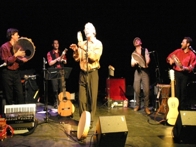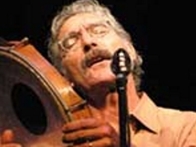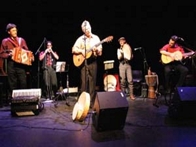
Categoriën



Taberna Mylaensis (I)
Categorie : in italie
Genre : siciliaanse muziek
Demo Materiaal: AUDIO1, AUDIO2, AUDIO3, AUDIO4, AUDIO5, AUDIO6, AUDIO7, AUDIO8
In een schitterende en veelkleurige theatershow ontvouwt Taberna Mylaensis het roerige verleden van het eiland Sicilië.
Sicilië fungeerde eeuwenlang als een kruispunt van handelswegen waardoor invloeden uit Griekenland, Italië, Frankrijk, Spanje en Noord-Afrika terug te vinden zijn in de culturele uitingen op dit prachtige eiland.
De groep Taberna Mylaensis komt uit Milazzo, de oude stad Mylae.
Op initiatief en onder leiding van Luciano Maio begon deze band met de herontdekking van de prachtige traditionele muziek van Sicilië; werkliederen die op ritmische wijze uitdrukking geven aan de opeenvolgende seizoenen, maar ook religieuze liederen, liefdesliederen en liederen over woede en protest.
In de muziek klinkt de rijke historie van Sicilië door.
De groep speelt repertoire uit de periode van de 16e tot de 19e eeuw voor het grootste gedeelte herbewerkt door Luciano Maio.
In de muziek zie je een organisch samengaan van invloeden uit Griekenland, Italië, Frankrijk, Spanje en de landen uit de Maghreb.
Dit komt omdat Sicilië in de loop der eeuwen door al deze landen is overheerst.
De kracht van Taberna Mylaensis is dat de groep ons dit alles laat horen.
In hun bestaan groeide Taberna Mylaensis uit tot de toonaangevende groep op het gebied van traditionele Siciliaanse muziek en de groep werd vele malen uitgenodigd om Italië te vertegenwoordigen op interculturele manifestaties en festivals in Europa.
De groep participeerde in verschillende TV programma’s als Reiziger in muziek van Han Reiziger bij de VPRO en radioprogramma’s in binnen en buitenland.
Taberna Mylaensis (Sicilia)
Luciano Maio: voce, chitarra, mandola, tamburo, marranzano
Antonio Vasta: fisarmonica, organetto diatonico, piano, zampogna a paru,voce
Mario Incudine: chitarra battente, bouzuki, mandolino, darbuka , voce
Antonio Putzu: frauti di canna, clarinetto, sax soprano, voce
Vincenzo Castellana: tammorra, tamburelli, djambé, darbuka, voce
Musicians
Luciano Maio
Luciano Maio has founded Taberna Mylaensis in 1975 and has been its historical leader ever since.
As an author and composer of lyrics, Luciano Maio is deeply involved in research activities concerning the recovery and revaluation of popular Sicilian culture and music.
Antonio Vasta
Antonio Vasta has qualified as a pianist at the "Vincenzo Bellini" Conservatory in Palermo.
He has been active in various musical groups for many years.
He has taken part in international music festivals with Taberna Mylaensis by playing Sicilian bagpipe, accordion.
He has worked on the last CD with Luciano Maio by focusing on the arrangements.
Antonio Putzu
Antonio Putzu has completed his clarinet studies at the Conservatory "Vincenzo Bellini" in Palermo.
He already has a rich background as a folk musician by playing traditional bamboo flute with other Sicilian folkloristic groups.
He is part of Taberna Mylaensis and recorded Taberna's last CD "E vinniru du mari...Federicu".
Mario Incudine
Mario Incudine studies the Art Academy (DAMS) in Palermo with a specialization on traditional vocals and typical instruments such as the mandolin, mandola, guitar, and bouzuki.
He has worked with several folk groups and is part of Taberna Mylaensis, he participated in the recording of Taberna's last CD "E vinniru du mari...Federicu.
Vincenzo Castellana
Vincenzo Castellana plays traditional tambourine Sicilian and ethnic percussion.
He studies at the Art Academy (DAMS) in Palermo.
He has been part of Taberna's winter tour in Holland and Istanbul and has participated in the recording of Taberna's last CD "E vinniru du mari…Federicu,
Repertoire
The repertoire that Taberna Mylaensis actually proposes, is a journey along the feelings and passions present in Sicilian popular culture, influenced by all kinds of Mediterranean cultures such as the Greek, Spanish an Arab culture.
Sicilian Music Teatre, folksongs, folklore dance, ballade, poetry and instrumental songs on traditional instruments.
Taberna Mylaensis' repertoire features Mediterranean music with dialectical lyrics, that expresses both scientific and popular philosophies, the relationship between the southern man with his ancient culture and modern transformation and his confrontation with the elements of nature and his mystic conception of the universe surrounding him: sea, moon, land, sun, sirocco…
Oriental and Occidental cultures which collide.
The Sicilian Poetry School in the Norman period brings us to Frederick II of Swabia, the historical figure that remains in the collective memory as the Norman Emperor who surprised the world as the miracle transformer, the so called 'Stupor Mundi' who generated confusion and fear because he tried to change the establishment.
Frederick was a Sicilian and a world citizen.
Under his guidance the Sicilian people, a mix of various races, began to feel as one and gain awareness of their own history and heritage.




